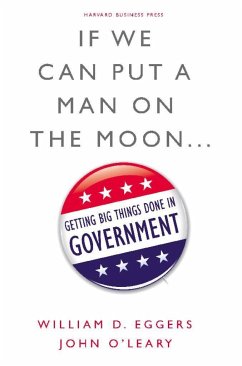The American people are frustrated with their government-dismayed by a series of high-profile failures (Iraq, Katrina, the financial meltdown) that seems to just keep getting longer. Yet our nation has a proud history of great achievements: victory in World War II, our national highway system, welfare reform, the moon landing.
We need more successes like these to reclaim government's legacy of competence. In If We Can Put a Man on the Moon, William Eggers and John O'Leary explain how to do it. The key? Understand-and avoid-the common pitfalls that trip up public-sector leaders during the journey from idea to results.
The authors identify pitfalls including:
-The Partial Map Trap: Fumbling handoffs throughout project execution
-The Tolstoy Syndrome: Seeing only the possibilities you want to see
-Design-Free Design: Designing policies for passage through the legislature, not for implementation
-The Overconfidence Trap: Creating unrealistic budgets and timelines
-The Complacency Trap: Failing to recognize that a program needs change
At a time of unprecedented challenges, this book, with its abundant examples and hands-on advice, is the essential guide to making our government work better. A must-read for every public official, this book will be of interest to anyone who cares about the future of democracy.
Hinweis: Dieser Artikel kann nur an eine deutsche Lieferadresse ausgeliefert werden.
We need more successes like these to reclaim government's legacy of competence. In If We Can Put a Man on the Moon, William Eggers and John O'Leary explain how to do it. The key? Understand-and avoid-the common pitfalls that trip up public-sector leaders during the journey from idea to results.
The authors identify pitfalls including:
-The Partial Map Trap: Fumbling handoffs throughout project execution
-The Tolstoy Syndrome: Seeing only the possibilities you want to see
-Design-Free Design: Designing policies for passage through the legislature, not for implementation
-The Overconfidence Trap: Creating unrealistic budgets and timelines
-The Complacency Trap: Failing to recognize that a program needs change
At a time of unprecedented challenges, this book, with its abundant examples and hands-on advice, is the essential guide to making our government work better. A must-read for every public official, this book will be of interest to anyone who cares about the future of democracy.
Hinweis: Dieser Artikel kann nur an eine deutsche Lieferadresse ausgeliefert werden.
Eggers and O'Leary may have created a new genrethe Government Policy Thriller. We couldn't get enough of the storiesgood policies gone bad, great ideas that flew off the rails, and, occasionally, the stunning triumph that gives us hope that we can get to the moon again." - Chip and Dan Heath, coauthors of Made to Stick: Why Some Ideas Survive and Others Die
A clear-eyed look at how to get the best out of our public institutions. Instead of easy answers, the authors offer practical suggestions for successful execution in a very challenging and complex environment. A must-read for political leaders." --Senator Kay Bailey Hutchinson
As we sort out the cross-pressures in twenty-first-century government, this book is a useful and lively guide to how to make things work. Driven by practical cases and pragmatic lessons, it's an invaluable road map to the government of the future." - Donald F. Kettl, Dean, School of Public Policy, University of Maryland
If We Can Send a Man to the Moon is the rare book that made me both shake my head in disbelief and nod my head with possibility. Eggers and O'Leary offer a trenchant analysis of how good government intentions can go awry. But they also show how sharper thinking and keener attention to design can help governments at all levels serve citizens better. Pick up two copiesone to read yourself, the other to send to your favorite elected official." - Daniel H. Pink, author of A Whole New Mind
After serving as a mayor, a congressman for twenty years, and as a secretary of two cabinet-level departments in two administrations from different political parties, I can attest that the challenges of executing successful government programs exist at all levels of government, in all parties, and in all locations. Eggers and O'Leary present exactly the most common traps that lead to a failure of execution, but more importantly they present ways to help avoid those traps. Their ideas should be presented to all government employees." - Former Secretary of Transportation Norman Mineta
A clear-eyed look at how to get the best out of our public institutions. Instead of easy answers, the authors offer practical suggestions for successful execution in a very challenging and complex environment. A must-read for political leaders." --Senator Kay Bailey Hutchinson
As we sort out the cross-pressures in twenty-first-century government, this book is a useful and lively guide to how to make things work. Driven by practical cases and pragmatic lessons, it's an invaluable road map to the government of the future." - Donald F. Kettl, Dean, School of Public Policy, University of Maryland
If We Can Send a Man to the Moon is the rare book that made me both shake my head in disbelief and nod my head with possibility. Eggers and O'Leary offer a trenchant analysis of how good government intentions can go awry. But they also show how sharper thinking and keener attention to design can help governments at all levels serve citizens better. Pick up two copiesone to read yourself, the other to send to your favorite elected official." - Daniel H. Pink, author of A Whole New Mind
After serving as a mayor, a congressman for twenty years, and as a secretary of two cabinet-level departments in two administrations from different political parties, I can attest that the challenges of executing successful government programs exist at all levels of government, in all parties, and in all locations. Eggers and O'Leary present exactly the most common traps that lead to a failure of execution, but more importantly they present ways to help avoid those traps. Their ideas should be presented to all government employees." - Former Secretary of Transportation Norman Mineta








